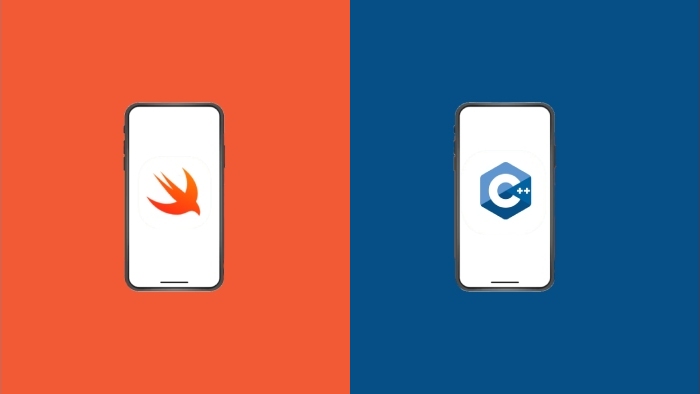The choice between Swift and C++ often arises, particularly in the context of app development. Both languages have their strengths and weaknesses, and the decision on which one to use depends on various factors including project requirements, performance needs, developer familiarity, and platform compatibility. In this blog, we’ll delve into a detailed comparison of Swift and C++, highlighting their features, use cases, and suitability for app development.
Swift:
Swift is a modern, multi-paradigm programming language developed by Apple Inc. It was introduced in 2014 as a replacement for Objective-C for iOS, macOS, watchOS, and tvOS app development. Here are some key features of Swift:
Safety: Swift is designed with safety in mind. It eliminates entire classes of unsafe code and provides features such as optionals, type inference, and memory management mechanisms like Automatic Reference Counting (ARC) to prevent common programming errors.
Expressiveness: Swift offers a clean and expressive syntax that makes code easy to read and write. It supports modern programming concepts like functional programming, generics, and closures, enhancing developer productivity.
Interoperability: Swift is fully interoperable with Objective-C, allowing developers to use both languages within the same project. This enables seamless integration with existing Objective-C codebases and libraries, making migration to Swift incremental rather than a complete overhaul.
Performance: Swift is known for its high performance, rivaling Objective-C and even surpassing it in some cases. It achieves this through various optimizations such as aggressive compiler optimization, efficient memory management, and direct access to the performance-enhancing features of Apple’s platforms.
Platform Support: Swift is primarily used for developing apps for Apple’s ecosystem, including iOS, macOS, watchOS, and tvOS. While there have been efforts to port Swift to other platforms, its primary focus remains on Apple’s platforms.
C++:
C++ is a powerful, general-purpose programming language created by Bjarne Stroustrup in 1985. It is widely used for system programming, game development, embedded systems, and performance-critical applications. Here are some key features of C++:
Performance: C++ is renowned for its high performance and efficiency. It provides low-level control over system resources and allows developers to fine-tune code for optimal performance. C++ code can be highly optimized and tailored to specific hardware architectures.
Portability: C++ code is highly portable across different platforms and architectures. It is supported by virtually all operating systems and hardware platforms, making it suitable for developing cross-platform applications and libraries.
Flexibility: C++ is a versatile language that supports multiple programming paradigms, including procedural, object-oriented, and generic programming. This flexibility allows developers to choose the most appropriate paradigm for each part of their codebase, depending on the requirements.
Legacy Codebase: C++ has a vast ecosystem of libraries, frameworks, and tools accumulated over decades. Many existing software systems and projects are written in C++, making it indispensable for maintaining and extending legacy codebases.
Learning Curve: C++ has a steep learning curve, especially for beginners. Its complex syntax and myriad of features can be daunting for novice programmers. However, mastering C++ can provide a deeper understanding of computer science concepts and make learning other languages easier.
Which is Better for App Development?
When it comes to app development, the choice between Swift and C++ depends on several factors:
Platform: If you’re targeting Apple’s platforms exclusively (iOS, macOS, etc.), Swift is the obvious choice due to its native support and seamless integration with Apple’s development tools and frameworks. However, if you’re developing cross-platform applications or targeting platforms outside of Apple’s ecosystem, C++ offers better portability.
Performance Requirements: For performance-critical applications where every CPU cycle counts, such as high-end games or real-time systems, C++ may be more suitable due to its lower-level control and ability to fine-tune code for maximum efficiency. Swift, while performant, may not offer the same level of control over system resources.
Developer Familiarity: If you or your team are already proficient in one of the languages, it may be beneficial to stick with that language to leverage existing expertise and minimize the learning curve. However, if you’re starting from scratch or have a team with mixed skill sets, consider factors such as ease of learning and availability of resources and support.
Project Requirements: Consider the specific requirements of your project, including scalability, maintainability, and compatibility with existing codebases. Swift’s safety features and modern syntax may lead to more maintainable and bug-free code in the long run, whereas C++’s performance and flexibility may be advantageous for certain types of applications.
In conclusion, both Swift and C++ are powerful languages with distinct advantages and use cases. For app development targeting Apple’s platforms, Swift is the preferred choice, offering safety, performance, and seamless integration with Apple’s ecosystem. However, for cross-platform applications or performance-critical systems, C++ may be more suitable due to its portability, performance, and flexibility. Ultimately, the decision should be based on careful consideration of project requirements, developer expertise, and long-term goals.


